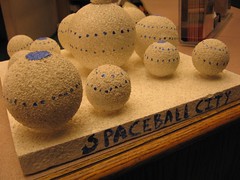presenter: Bradley Robb
“A couple of tips for improving your blog’s readership and like 26 pictures of kittens”
A comprehensive digital strategy is what you are going to use when you build anything online. When you start a blog, you are committing yourself to putting out content forever.
The field of dreams fallacy: just because you blog it doesn’t mean anyone will read it. Knowing your visitors means knowing your visitor types. Referral traffic is your goal. Blog readership is not a zero-sum game; your fellow bloggers are your peers.
Quantitative analysis like page ranks compares apples to apples. But if you want to compare apples to oranges, you need to look at different things. Post frequency will increase popularity, particularly for those who do not read via RSS. Comment frequency is an indicator of post frequency. You also want to pay attention to whether the commenters are responding to the post or responding to each other (i.e. creating a community).
Amass, prioritize, track, repeat: Find all of the people who are talking about your niche in a full-time manner. Evaluate your own blog, then develop a rubric to compare your site to peers. Create a list of blogs where you’d like to guest post. Track your successes and failures – Robb suggests using a spreadsheet (blogs tracked, comments, linkbacks, etc.). Keep adding to your amassed list, keep evaluating your standing, and keep tracking.
You need to be reading the blogs in your community, but that can take a lot of time. Following their Twitter feeds might be faster. And if you’re not using RSS, you should be.
“Commenting on blogs is like working a room at a party with one major exception: nobody knows if you’re wearing pants.”
Make your comment relevant, short, interesting, but don’t steal the show. Make sure you put your blog anchor page in the URL field of the comment form. You want people to track back to your blog, right? If there is an option to track the comments, do it. It’s okay to disagree, but be intelligent about it. Be yourself, but better (and sign with your name, not your blog/book/etc.). Count to ten before you hit send, not just for keeping a cool head, but also for correcting grammatical errors.
Guest posting: write the post before you pitch it. It indicates that you understand the blog and it’s content, and that you can write. Plus, they won’t be waiting on you for a deadline.
Measure twice, cut once: If your commenting strategy isn’t working, then figure out how to change it up. Are you getting traffic? Are your comments being responded to?
Give them something to talk about. If you’re doing all this strategy, make sure you have something worth reading.
Questions:
Recommended features & widgets? Robb doesn’t use many widgets. Trackbacks is a big backend feature. Disqus can aggregate reactions, which you can publish with the post.
What are easy ways to get people to comment on your blog? There are several methods. One is to be wrong, because the internet will tell you that you’re wrong, and that can drive comment traffic. Another is to publish a list.
How do you know what to write about? By following the niche/industry, you can get a feel for hot topics and trends.
Do you have any specific strategies for using Facebook for publicizing your blog? Robb hates Facebook and it’s personal data-stealing soul. He recommends the same strategy as Twitter: for every ten posts about something else, post one promoting your blog.
What about communities like Digg or Reddit? Unless you hit the front page, you don’t really get enough traffic to warrant the time.
How many ads are too many? Depends on how big of a boat you want. If you build your theme to incorporate ads smartly, you don’t need as many of them to be successful with them. In print journalism, the page is designed for the ads with the news filling the rest.


